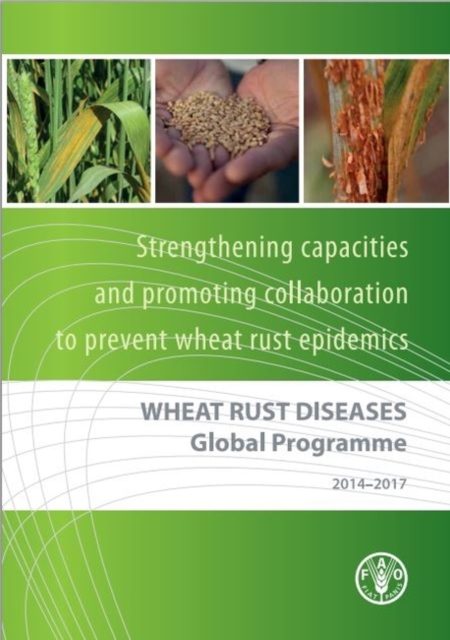
Wheat Rust Diseases Global Programme 2014-2017 : strengthening capacities and promoting collaboration to prevent wheat rust epidemics Paperback / softback
by Food and Agriculture Organization
Paperback / softback
- Information
Description
Wheat is a source of food and livelihoods for over 1 billion people in developing countries.
A major staple food crop in many countries, it is an important source of nutrition, providing on average 40 percent of per capita calorie intake.
Drought, floods and diseases severely affect wheat production.
Exacerbated by climatic stress, especially in rainfed areas, the impact of wheat diseases is expected to increase.
During the past decade a number of virulent strains of wheat rust diseases have emerged, causing global concerns to wheat production.
The wheat stem rust race Ug99 is highly virulent on the majority of world wheat varieties - the risk that it could cause a global epidemic is real.
Ug99 is well established in East Africa and Yemen and has spread to the Islamic Republic of Iran.
In 2010 and 2013, a new, virulent strain of yellow rust, Yr27, has caused severe outbreaks and losses in many countries in North and East Africa, the Near East and South Asia.
Due to ever changing genetics of these pathogens they need to be monitored continuously.
Wheat production in Northern and Eastern Africa, the Near East and West, Central and South Asia is vulnerable to rust diseases.
These regions account for around 37 percent of global wheat production.
The cost of a 10 percent loss in areas at risk is estimated to exceed USD 5.8 billion.
The impact on food and nutrition security is estimable.
To combat wheat rust diseases continuous surveillance as well as a programmatic management approach are essential.
Information
-
Available to Order - This title is available to order, with delivery expected within 2 weeks
- Format:Paperback / softback
- Pages:61 pages, col. figs, maps, tables
- Publisher:Food & Agriculture Organization of the United Nati
- Publication Date:30/10/2014
- Category:
- ISBN:9789251082850
Information
-
Available to Order - This title is available to order, with delivery expected within 2 weeks
- Format:Paperback / softback
- Pages:61 pages, col. figs, maps, tables
- Publisher:Food & Agriculture Organization of the United Nati
- Publication Date:30/10/2014
- Category:
- ISBN:9789251082850